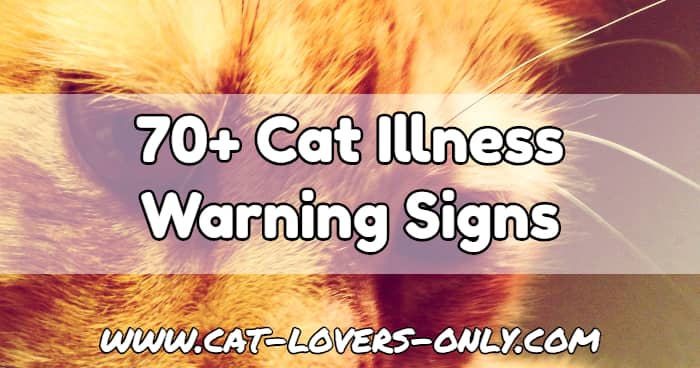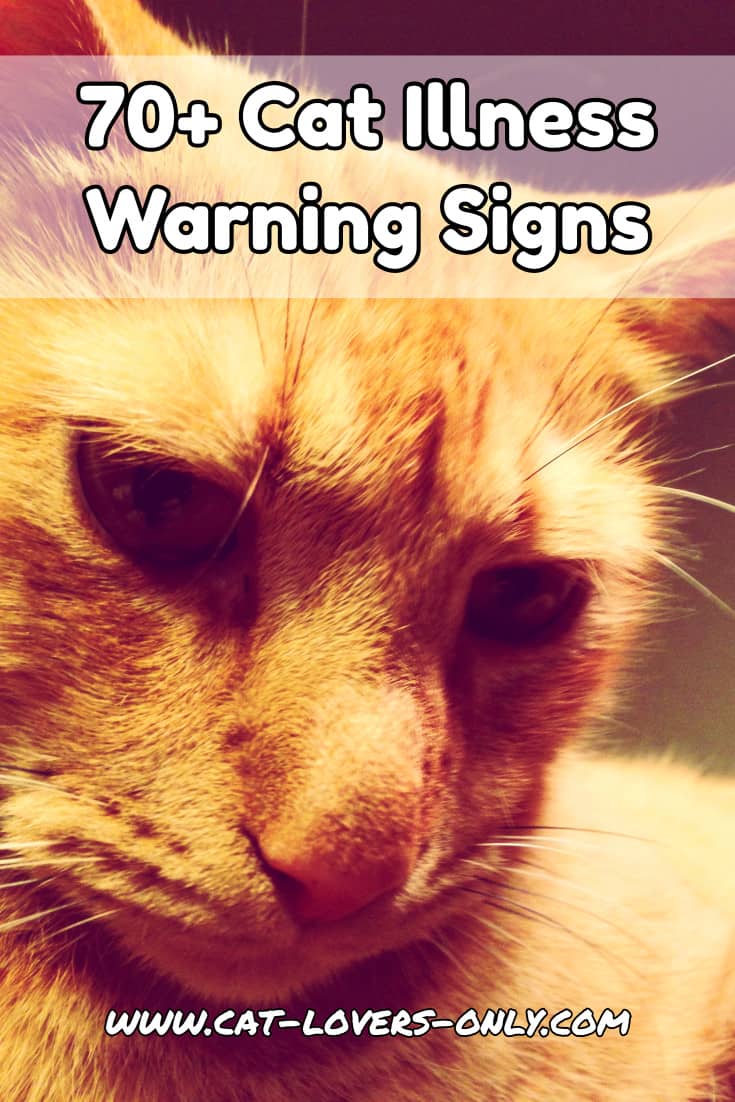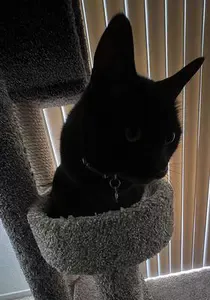70 Cat Illness Warning Signs
Worried that your cat may be sick?
Here are over 70 cat illness warning signs that could be an indication of a disease or disorder in your cat.
While you can't diagnose your cat via the Internet, this list can help make you aware of what to look for.
I'll start with a few opening notes and then get into the list...

If you're looking for symptoms by disease, I've cataloged a number of the better known ones in the symptoms guide. In addition to those contained there, below are many of the signs and symptoms of sick cats.
Your cat has some feline specific health risks of which you should be aware.
In addition to clear symptoms of disease, a change in behavior can be a sign of a disorder as well.
Since your cat can't speak up, you'll have to be alert to your cat's behavior.
Take particular notice of your cat's usual routine and behavior so that you'll know when there's a change.
As mentioned in these cat care tips, you should have frequent grooming sessions with your cat.
During these grooming sessions, you should examine her for some of the signs of feline diseases while removing excess fur.
Since
most cats enjoy these sessions, this is a good way to check your cat
for some of these symptoms while she's content and distracted.
General Signs of Cat Illness
- Coughing
- Sneezing
- Nasal Discharge
- Drooling
- Lethargy
- Fever
- Excessive vomiting
- Blood in vomit
- Evidence of worms in vomit
- Any signs of pain or tenderness
- Lameness
- Trouble breathing (Sometimes evidenced by a refusal to lie down, keeping the head and chest up)
- Weakness
- Failure to jump as high as normal
- Staggered, stiff, or unsteady or uneven walk
- Sudden or repeated loss of balance
- Fainting
- Falling down with no apparent cause
- Excessive or prolonged head shaking
- Rapid weight loss or gain
- Swollen or tight abdomen or bloated appearance
Changes in Appetite or Thirst
- Difficulty chewing or eating or swallowing
- Loss of appetite
- Increased thirst
- Failure to drink
- Hovering over the drinking bowl but refusing to drink
Problems with Urination and Defecation
- Blood in urine
- Difficulty urinating*
- Excessive Urination (combined with excessive thirst)
- Howling or crying out when using the litter box
- Repeated visits to the litter box with no success
- Straining while urinating or defecating
- Litter box problems (inappropriate elimination or refusal to use the litter box)
- Blood in stool
- Black, tarry stools
- Worms or rice-looking particles in stool
- Diarrhea may be a sign of many illnesses
- Constipation
*Note:
In male cats with urinary problems, an obstruction in the urinary tract
is a life threatening condition.
Behavioral Changes
As I've mentioned elsewhere (and I can't stress this enough). A significant change in your cat's behavior or habits could be a medical problem and warrants a vet visit.
Various changes in cat behavior can be an indicator of either emotional or physical problems. Learn more about cat behavior here.
Here are some behavior changes to watch for in your house lion:
- Dramatic change in behavior or routine
- Change in sleeping habits
- Appearing confused or disoriented (sometimes with yowling)
- Not wanting to lie down and favoring sitting up straight instead (could indicate breathing problems or congestive heart failure)
- Uncharacteristic spitting or hissing behavior
- Uncharacteristic hiding or anti-social behavior
- Resenting being held, picked up, or pet/touched
- Excessive scratching
- Excessive licking behavior
- Excessive repeated licking of a particular area
- Excessive howling or crying out for no apparent reason
- Unusual aggression towards other pets or people
- Any other strange cat behaviors that are uncharacteristic
Eye Problems
Clear, bright eyes are often a sign of good health. They may also be a sign of youth.
In contrast, as a cat ages, the eyes tend to look more cloudy or hazy. This is part of the normal aging process, but it can also be a sign of illness, such as cataracts.
Your vet can examine your cat's eyes to determine whether or not it's age related, or illness related. Here are some things to look for:
- Haws (nictitating membrane - the "third" eyelid) showing
- Dull, hazy, or cloudy eyes
- Pupils of uneven size
- Ocular discharge
Mouth Problems
- Ulceration of the mouth
- Bad breath
- Pallor of lips and gums
- Abnormal growths
Skin and Hair Issues
- Skin growths
- Oily appearance to the skin and coat
- Dandruff or skin flaking or scaling
- Lumps or nodules under the skin
- Any kind of swelling
- Skin eruptions, redness, or irritation
- Wounds
- Poor coat
- Hair loss
- Failure to self-groom
- Coat standing slightly erect
- Cat Parasites on skin or fur
More about Cat Illnesses
Cat health problems are many and varied, and feline illness symptoms, like that in humans, often overlap.
Your cat can develop bacterial infections and viruses such as a cold or flu just like you can.
She can also get parasites, cancer, and a host of feline specific ailments.
Your cat is at greater risk for developing illness if recently injured or debilitated by some other condition, recovering from a procedure or surgery, or there is increased stress due to a recent life-changing event in the home.
This may include the addition or removal of a family member or other pet, change of residence, or other event.
Older cats are at greater risk of developing certain conditions. Senior cat health problems, some of which are termed "age-related" are increasingly being blamed on a combination of diet and environmental factors.
Outdoor cats are generally more susceptible to disease than indoor cats, as are cats who are not vaccinated. Certain feline illnesses are preventable and have available vaccines. Not all cats should receive all vaccines, and there are some facts (schedule, benefits, risks, etc.) with which you should be familiar.
Here are some facts you should know about cat vaccinations, and here are some of the risks, as well as a list of cat vaccination resources.
Whether your cat is old or young, vaccinated or not, indoor or outdoor, some of these ailments will require treatment. If you suspect your cat may be ill, it's best to call your veterinarian and get some direction. Then, if things seem to get worse, both you and your vet will be better prepared to handle the situation.
If you need to buy pet medication for your cat, you can save money by purchasing it online. Some of these medications may be covered by cat insurance plans when purchased with certain options.
If your veterinarian agrees, there are a number of that are said to boost the immune system of your cat. A stronger immune system, in theory, would mean less incidence of cat illness.
This
list is by no means exhaustive, but should be helpful in both keeping
alert to possible issues, and giving you talking points for a discussion
with your veterinarian.
Related Topics
Treatment for diarrhea in cats



Comments: What do you think?
Have your say about what you just read. Leave me a comment in the box below.